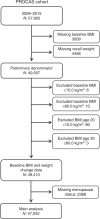Young adulthood body mass index, adult weight gain and breast cancer risk: the PROCAS Study (United Kingdom)
- PMID: 32203222
- PMCID: PMC7217761
- DOI: 10.1038/s41416-020-0807-9
Young adulthood body mass index, adult weight gain and breast cancer risk: the PROCAS Study (United Kingdom)
Abstract
Background: We tested the hypothesis that body mass index (BMI) aged 20 years modifies the association of adult weight gain and breast cancer risk.
Methods: We recruited women (aged 47-73 years) into the PROCAS (Predicting Risk Of Cancer At Screening; Manchester, UK: 2009-2013) Study. In 47,042 women, we determined BMI at baseline and (by recall) at age 20 years, and derived weight changes. We estimated hazard ratios (HRs) and 95% confidence intervals (CIs) for new breast cancer using Cox models and explored relationships between BMI aged 20 years, subsequent weight changes and breast cancer risk.
Results: With median follow-up of 5.6 years, 1142 breast cancers (post-menopausal at entry: 829) occurred. Among post-menopausal women at entry, BMI aged 20 years was inversely associated [HR per SD: 0.87 (95% CI: 0.79-0.95)], while absolute weight gain was associated with breast cancer [HR per SD:1.23 (95% CI: 1.14-1.32)]. For post-menopausal women who had a recall BMI aged 20 years <23.4 kg/m2 (75th percentile), absolute weight gain was associated with breast cancer [HR per SD: 1.31 (95% CIs: 1.21-1.42)], but there were no associations for women with a recall BMI aged 20 years of >23.4 kg/m2 (Pinteraction values <0.05).
Conclusions: Adult weight gain increased post-menopausal breast cancer risk only among women who were <23.4 kg/m2 aged 20 years.
Conflict of interest statement
A.G.R. has received lecture honoraria from Merck Serona and Janssen-Cilag, and independent research funding and lecture honoraria from Novo Nordisk and Sanofi Pasteur MPS, unrelated to this study. The other authors declare no competing interests.
Figures
References
-
- World Cancer Research Fund/American Institute for Cancer Research. Diet, Nutrition, Physical Activity and Cancer: A Global Perspective. Continuous Update Project Expert Report 2018. dietandcancerreport.org
Publication types
MeSH terms
Grants and funding
LinkOut - more resources
Full Text Sources
Medical


